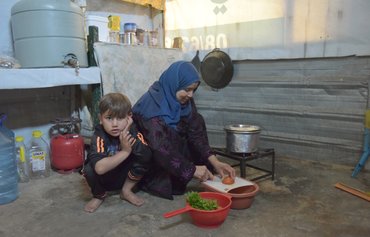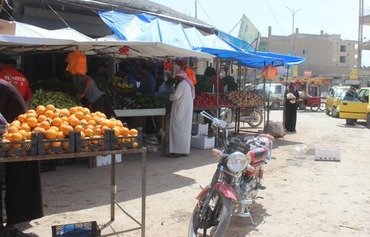BEIRUT -- Russia's Ukraine invasion, which has exacerbated food woes in parts of the Middle East/North Africa, is marring preparations for the holy month of Ramadan and forcing many to settle for a frugal iftar meal.
In countries like Lebanon, Egypt and Yemen, Muslims who traditionally break the dawn-to-dusk fast with lavish family meals are now struggling to secure even the most basic staples in light of skyrocketing food and fuel prices.
Russia and Ukraine, with vast grain-growing regions that are among the world's main breadbaskets, account for a huge share of the globe's exports in several major commodities such as wheat, vegetable oil and corn.
The disruption in export flows resulting from Russia's invasion and international sanctions has spurred fears of a global hunger crisis, especially across the Middle East and Africa, where the knock-on effects are already playing out.
![This aerial view shows Syrians buying food at a market ahead of iftar in the southern Idlib city of Ariha, on April 15. [Omar Haj Kadour/AFP]](/cnmi_di/images/2022/04/01/34798-syria-iftar-shopping-600_384.jpg)
This aerial view shows Syrians buying food at a market ahead of iftar in the southern Idlib city of Ariha, on April 15. [Omar Haj Kadour/AFP]
![Yemeni volunteers prepare food aid for iftar to be distributed to the poor and needy in Sanaa, on April 20. [Mohammed Huwais/AFP]](/cnmi_di/images/2022/04/01/34799-Yemen-iftar-volunteers-600_384.jpg)
Yemeni volunteers prepare food aid for iftar to be distributed to the poor and needy in Sanaa, on April 20. [Mohammed Huwais/AFP]
The toll is most evident in countries such as Yemen, the Arab world's poorest, where a devastating war set off by the Iran-backed Houthis' coup of 2014 has sparked one of the world's worst humanitarian crises.
Food prices there have doubled since last year, and fears of a deepening famine have grown, as Ukraine supplies nearly a third of Yemen's wheat imports.
Sanaa resident Mohsen Saleh said that every year prices shoot up ahead of Ramadan, "but this year, they have increased in a crazy way".
"People can't take it," he said. "The economic situation is very difficult. Most people in Yemen are poor and exhausted."
Frugal iftar meals
In Syria, where a conflict since 2011 has plunged nearly 60% of the population into food insecurity, Ramadan to many has become a painful reminder of better, bygone days.
Cooking oil has more than doubled in price since the start of the Ukraine war and is sold in limited quantities.
The Syrian regime, not spared by its status as a staunch Moscow ally, is also rationing wheat, sugar and rice.
"I thought last Ramadan was going to be our most frugal," said Damascus resident Basma Shabani, looking back at a year also marred by the coronavirus pandemic.
"But it seems that this year we will remove even more dishes from our spread.
"We can't afford more than one type of dish on our table anymore, and I am worried that in the future even this one dish will be beyond our reach."
In Lebanon, too, local charity networks are unravelling as the Ukraine crisis piles more pressure on a population hit hard by an unprecedented economic crisis since 2019 and a massive influx of Syrian refugees fleeing the war.
"The strong solidarity which comes into action especially in months like Ramadan will be dramatically tested this year," said Bujar Hoxha, Lebanon director for Care International.
"Hyperinflation and soaring food prices in local markets make the long-awaited Ramadan month for many Lebanese challenging," he said.
Many will "struggle to bring iftar meals to the table".
There are fears that a bread crisis is looming in Lebanon, which imports about 60% of its wheat, grain and vegetable oil from Ukraine.
Lebanese Economy and Trade Minister Amin Salam has said he is concerned that the price of a tonne of wheat could rise by 30 to 40%, which would see the cost per tonne jumping from between $360 and $400 to about $500.
'Everything is more expensive'
In Egypt, a leading importer of wheat from the former Soviet states, Muslims are tightening their purse strings ahead of Ramadan.
President Abdel Fattah al-Sisi in March ordered a price cap on unsubsidised bread after the Russian invasion triggered a 50% rise.
The local currency also lost 17% of its value that same month.
"If someone used to buy 3kg of vegetables, now they're only buying one," said Om Badreya, a street vendor in western Cairo.
Even oil-rich Saudi Arabia is feeling the pinch.
"Everything is getting more expensive... every time I pay around 20-30 SAR ($5-$8) more for the same products," said Ahmad al-Assad, a private sector employee.
Qatar, however, has emerged as an exception with the government decreasing food prices ahead of Ramadan in a symbolic gesture.
"Prices of more than 800 commodities have been reduced in co-ordination with major outlets in Qatar, starting from Wednesday (March 23) until the holy month of Ramadan," said Qatar's commerce and industry ministry.

![A woman grills chicken near a grave, as she prepares the iftar meal in the Ghoraba cemetery in Lebanon's northern port city of Tripoli on April 14, where multiple marginalised families reside. [Ibrahim Chalhoub/AFP]](/cnmi_di/images/2022/04/01/34797-lebanon-iftar-meal-600_384.jpg)






